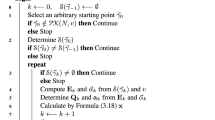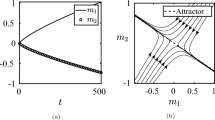Abstract
McGarvey (Econometrica, 21(4), 608–610, 1953) has shown that any irreflexive and anti-symmetric relation can be obtained as a relation induced by majority rule. We address the analogous issue for dominance relations of finite cooperative games with non-transferable utility (coalitional NTU games). We find any irreflexive relation over a finite set can be obtained as the dominance relation of some finite coalitional NTU game. We also show that any such dominance relation is induced by a non-cooperative game through β-effectivity. Dominance relations obtainable through α-effectivity, however, have to comply with a more restrictive condition, which we refer to as the edge-mapping property.
Similar content being viewed by others
References
Abdou J., Keiding H. (1991) Effectivity functions in social choice. Kluwer Academic Publishers, Boston
Aumann R.J. (1959) Acceptable points in general n-person games. In: Tucker A.W., Luce R.D. (eds) Contributions to the theory of games IV, volume 40 of annals of mathematics studies. Princeton University Press, Princeton, pp 287–324
Aumann R. J. (1961) The core of a cooperative game without side payments. Transactions of the American Mathematical Society 98: 539–552
Aumann R. J., Peleg B. (1960) Von Neumann-Morgenstern solutions to cooperative games without side payments. Bulletin of the American Society 66: 173–179
Bergin J., Duggan J. (1999) An implementation-theoretic approach to non-cooperative foundations. Journal of Economic Theory 86: 50–76
Dutta B., Laslier J.-F. (1999) Comparison functions and choice correspondences. Social Choice and Welfare 16(4): 513–532
Farquharson R. (1969) Theory of voting. Yale University Press, New Heaven
Fishburn P. C. (1977) Condorcet social choice functions. SIAM Journal on Applied Mathematics 33(3): 469–489
Hart S., MasColell M. (1996) Bargaining and value. Econometrica 64(2): 357–380
Kalai E., Samet D. (1985) Monotonic solution concepts to general cooperative games. Econometrica 53(2): 307–328
Kıbrıs Ö, Sertel M. R. (2007) Bargaining over a finite set of alternatives. Social Choice and Welfare 28: 421–437
Lahiri S. (2007) A weak bargaining set for contract choice problems. Research in Economics 61(4): 185–190
Laslier J.-F. (1997) Tournament solutions and majority voting. Springer-Verlag, Heidelberg
Luce R.D., Raiffa H. (1957) Games and decisions: Introduction and critical survey. John Wiley & Sons, New York
McGarvey D. C. (1953) A theorem on the construction of voting paradoxes. Econometrica 21(4): 608–610
Nash J. (1950) The bargaining problem. Econometrica 18: 155–162
Nash J. (1953) Two-person cooperative games. Econometrica 21: 128–140
Rubinstein A. (1982) Perfect equilibrium in a bargaining model. Econometrica 50(1): 97–109
Schwartz T. (1990) Cyclic tournaments and cooperative majority voting: A solution. Social Choice and Welfare 7: 19–29
Serrano R. (1997) A comment on the Nash program and the theory of implementation. Economic Letters 55: 203–208
Taylor A.D., Zwicker W.S. (1999) Simple games. Princeton, Princeton University Press
von Neumann J., Morgenstern O. (1947) Theory of games and economic behavior, 2nd ed. Princeton University Press, Princeton
Author information
Authors and Affiliations
Corresponding author
Rights and permissions
About this article
Cite this article
Brandt, F., Harrenstein, P. Characterization of dominance relations in finite coalitional games. Theory Decis 69, 233–256 (2010). https://doi.org/10.1007/s11238-009-9167-x
Received:
Accepted:
Published:
Issue Date:
DOI: https://doi.org/10.1007/s11238-009-9167-x




